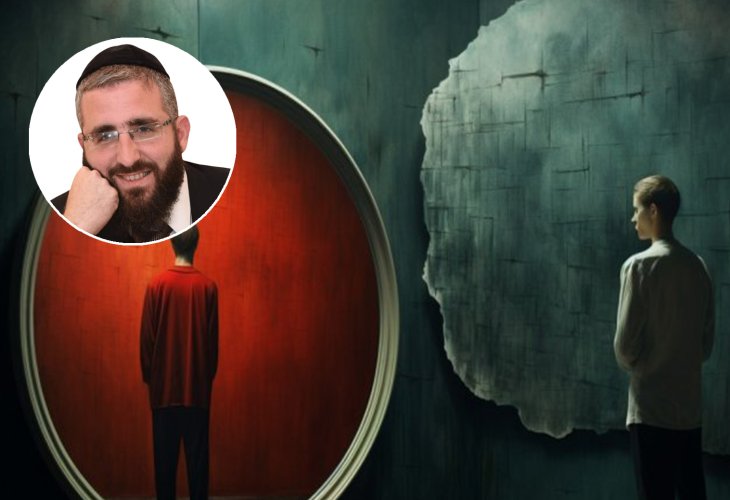Personality Development
How Idealizing Others Hurts Relationships: The Danger of Black-and-White Thinking
How embracing human complexity strengthens relationships, therapy, and self-worth.

This week, I had a warm and very complimentary conversation. That conversation led me to a deep insight that will shed new light on your relationships and connections in life. (I’ve made a few changes to protect the identity of the person involved.)
The conversation went something like this: “My name is Eliyahu,” the man began. “I live in the center of the country. I’m really excited to be speaking with you. For the past six months I’ve been following your articles on Hidabroot and listening to your radio show on ‘Kol Chai’ every Monday night. I never miss it. I’ll cancel anything just to listen." Eliyahu spent a few long minutes expressing admiration.
Then he got to the real reason for his call and he told me about his brother’s serious marital problems and asked for advice on how he might help. The conversation went on for quite some time, and at a certain point, I felt a sense of helplessness. I found it difficult to end the call and explain that I work by the hour and charge for counseling.
Generally at some point, I would pause the conversation and say gently but clearly that he’s welcome to book a paid consultation at my clinic. In this case however, something inside me was blocked and I couldn’t bring myself to say it.
During a session later that week with my own therapist, I brought up this situation and asked for help in understanding what had taken place. Through that process, I realized something very interesting about myself:
In life, we all have a deep need to lean on strong people. We’re constantly looking for someone we can rely on, someone stable, someone who can be our emotional anchor. And when we find such a person, we want to feel reassured that they are indeed strong enough to hold us.
This kind of dependency has a few components:
The weaker we feel, the more we seek a stronger anchor.
The person we choose as our emotional anchor may respond in one of two ways:
If they have a need to appear strong, they’ll play the part and radiate strength and confidence.
If they’re comfortable showing vulnerability, they’ll also reveal their human side- their doubts, struggles, fears, and emotions.
In my situation, what happened was a kind of unconscious dance. He began the call by describing me as strong and special, and I, in turn, played the part. It made it harder for me to reveal my more human side- such as the fact that I run on a schedule and charge for my time.
What happens in the therapy room?
Many clients come to therapy because they struggle with low self-worth or self-acceptance. They look to the therapist as an almost magical figure, a kind of angel or savior who holds the answers to all their problems.
Some therapists lean into that power dynamic and benefit from it. But that power is actually composed of three elements:
Magic – The idea that the therapist has some mystical healing powers, like a placebo effect.
Authority – The white coats of doctors or the framed diplomas on the therapist’s wall that give them symbolic power.
Mystery – The secrecy of the process: like prescriptions written in Latin, or psychological methods that the client doesn't understand or take part in.
What is actually healthy?
Should a therapist share their own struggles with a client? It depends, and the key is always, what is in the best interest of the client? This must be evaluated carefully.
In general, a therapist shouldn’t share personal details. The session is about the client. If however the client begins to idealize the therapist, by turning them into some perfect, infallible figure, the therapist must reflect on what is taking place. If a client turns their therapist into a symbol of pure “white,” they probably see themselves as completely “black.” This black-and-white thinking often extends to everyone in their life and people are either idolized or demonized.
If the therapist finds themselves enjoying that role, maintaining the fantasy the client has built around them, they need to explore why. Why do I want to appear as an all-powerful angel?
This dynamic doesn’t only take place in therapy. People often turn someone in their life into a “legendary” figure- a rabbi, a teacher, a counselor, a parent, a friend, or even a spouse. They lean on that person, believe in their perfection, and think they can do no wrong.
One day, they hear something about that person. It doesn’t need to be extreme- perhaps they just saw them act in a way that didn’t align with the image they had in mind. Suddenly, the person they once saw as completely “white” becomes, in their eyes, completely “black.”
They can’t tolerate “gray.” They can’t accept complexity. They can’t accept that the person is human- someone with beautiful parts and flawed ones, with processed and unprocessed areas, with moods and ups and downs.
The more we can accept our own humanity, the more we’ll be able to accept the humanity in others. We’ll be able to see that they, like us, are human beings. That perspective won’t just make our relationships easier, it will also reduce our fears. With that, the desperate need for a perfect anchor will begin to fade.
Rabbi Aryeh Ettinger is a counselor and the founder of a school for training marriage counselors.

